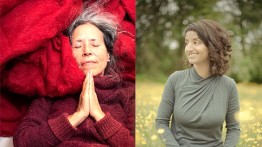veroír // Seehear the Unseen
Wednesday, September 30, 2020, 12:15 - 1:30pm

Poet, filmmaker, and artist Cecilia Vicuña will be in conversation with activist and artist Suzanne Dhaliwal, during an afternoon program that will take place as part of Cooper Union Climate Coalition's weeklong symposium. The duo will utilize their respective experiences in artmaking and political campaigning to frame ecological disaster and decolonization, in order to examine Indigeneity as it relates to activism, climate humanitarianism and creative practices. Along the way, the conversation will draw relations between institutional, archival and ecological memories, as well as disparate knowledge systems and ecosystems, in order to present their interdisciplinary visions for the vital next steps towards taking care of our collective world.
This program is presented in collaboration between Cooper Union x Climate Week and Pioneer Works.
Open to the public
Cecilia Vicuña is a poet, artist, filmmaker, and activist. Her work addresses pressing concerns of the modern world, including ecological destruction, human rights, and cultural homogenization. Born and raised in Santiago de Chile, she has been in exile since the early 1970s, after the military coup against elected president Salvador Allende. Vicuña began creating "precarious works" and quipus in the mid 1960s in Chile, as a way of "hearing an ancient silence waiting to be heard." Her multi-dimensional works begin as a poem, an image that morphs into a film, a song, a sculpture, or a collective performance. These ephemeral, site-specific installations in nature, streets, and museums combine ritual and assemblage. She calls this impermanent, participatory work “lo precario” (the precarious): transformative acts that bridge the gap between art and life, the ancestral and the avant-garde. Her paintings of early 1970s de-colonized the art of the conquerors and the "saints" inherited from the Catholic Church, to create irreverent images of the heroes of the revolution.
Suzanne Dhaliwal is an artist, activist, and campaigner, working on climate justice, indigenous rights, and mining issues, listed as one of the most popular voices on the Environment in 2018 by the Evening Standard. She is founder of the UK Tar Sands Network, which has worked for over a decade to campaign against corporations and financial institutions such as banks and insurers invested in the highly polluting Alberta Tar Sands. Suzanne has led high impact creative divestment campaigns to shift the insurance sector from underwriting coal and tar sands projects & artistic interventions to highlight environmental injustice of corporations including Shell & BP in the Niger Delta, Gulf Coast, and the Arctic. She has been working to amplify the voices of indigenous delegations at the international climate negotiations and centre the voices of Indigenous, Black, and POC voices in the climate movement internationally. She currently works as an artist, producer-writer, lecturer, anti-oppression trainer, and completed a research fellow at the University of Brighton examining race, media, art, and climate justice and as a media consultant with Indigenous Climate Action, and Indigenous Environmental Network




